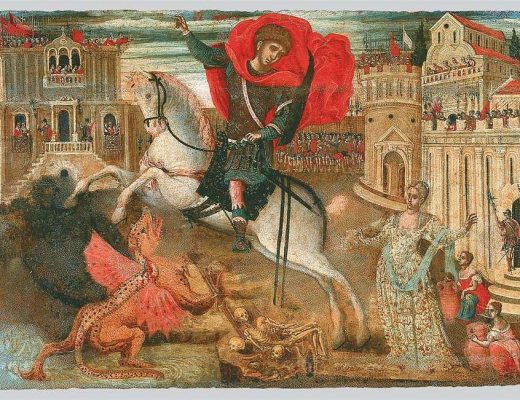Sun 11th Gift Day at St Edward’s
In the wake of the death of Her Majesty Queen Elizabeth II
Readings: Matthew 26:6-13 / 2 Cor 9:1-15
Do you know that in her time on the throne The Queen was given some really interesting gifts. For example, lots of animals – everything from horses and dogs to crocodiles and elephants. Jewellery, land, plants, books, clothes, and quite random but I love this – a painting of a swimming pig in The Bahamas. And relevant to us, when the Queen visited Pope Francis in 2014 he gave her a replica of a decree dating from 1679 in which Pope Innocent XI extended the veneration of St. Edward the Confessor to the Universal Church.
Often these gifts were incredibly extravagant – she was once given for example an 18-inch tall solid gold palm tree studded with pearls, during a visit to the Persian Gulf. Usually the gifts are really thoughtful too, representative of something with a connection to the person giving them – for example:
In 2015, the Queen was given bag of rock salt by the governor of the British Virgin Islands. The symbolic of ‘the tradition of the British Virgin Islands presenting its monarch with a bag of salt as a tax on the production of minerals.
And Michelle Obama reportedly gave her a beautifully curated and thoughtful honey inspired gift box, containing honey, tea, a candle and a jar of honey butter (homemade from the White House kitchen garden), and a Tiffany & Co. silver ‘honeycomb and bee bud vase’.
Today we heard about the woman who anointed Jesus with a gift that was both extravagant and thoughtful, in fact even prophetic. We read that in the home of Simon the Leper in Bethany, a woman came with an alabaster jar of very expensive perfume and poured it on his head. In an act that Jesus said would be retold and she would be remembered around the world.
We recently looked at Mark’s version of this story in our Tuesday mass. And the first question that often arises is: who is she? This story is told in all 4 gospels with variations, here in Matthew and Mark she is not named. In John she is Mary of Bethany (Martha and Lazarus’ sister) and in Luke she is a ‘sinful woman’ – sometimes thought to be Mary Magdalene.
So just as a small aside – for info this is not biblical. Mary Mag was not a prostitute, she was never named as such in the bible and there is no evidence that she was. Magdalene simply means she came from the town of Magdala.
She was however key in Jesus’ narrative, present at the crucifixion (in all 4 gospels so carries weight) and she visited the tomb after his death, the first one acc to John to see and hear the good news with Jesus appearing to her. John 20
There is some thought that the church wanted to down play her role as a woman so people sought to equateher with the sinful woman as mentioned in Luke. In fact it was Pope Gregory the Great who made this official in a 6th C sermon, despite there being no evidence for it. So for hundreds of years she was maligned due to the patriarchal state of the church. It was only in 1969 that the Church finally admitted the bible does not support that interpretation!
So in short we don’t know who she is and MM is not a prostitute.
I think it is really interesting that we don’t know who she is, because Jesus says that this story and therefore she, will be remembered. So what is it about her actions that are so important?
I think 2 reasons – her extravagance and thoughtfulness.
This perfume was ‘very expensive’ – Mark says it cost 300 denarii – and a denarii is about a days wages for a labourer so for your average person this was almost a year’s wages being poured over Jesus’ head. And it was even in an alabaster jar, expensive in itself. And of course the people there don’t get what is happening and complain and are angry, how dare this woman come in here and do such a wasteful thing? But why would they understand? It’s a bit like when we see someone abandoned in worship – dancing singings, falling over, and we might find it a little awkward, we’re embarrassed, don’t know how to respond so we criticise. Is that what they were doing?
Until Jesus says, it’s ok, she’s doing something really special – she’s preparing me for what is to come. For my burial. She’s anointing him as his body would be after death. She has intuitively gone to the heart of what is going on in Jesus’ life. Did she know the significance, did she simply feel led to do it? It was certainly an act done with great thought. And one that I would say was without doubt a prophetic act – symbolic of what was to come.
She was extravagant in what I think we can describe as an act of worship or devotion.
This was deeply personal for her, in several ways.
1. In her giving of herself, it was a personal action.
2. It was costly for her in that others around her questioned what she was doing, was it inappropriate for a woman to do this? Her reputation was at stake.
And 3. Financially – this was a costly perfume which she poured out for him.
I wonder how often we are extravagant in our giving of ourselves, of our time, talents and finances to the Lord?
Because giving is not just about money it is about giving all of ourselves.
You know I was thinking about what is the most precious commodity? If we were giving a lavish gift to the now King what might we give to be extravagant – and there are various things – ink for example – per gram is one of the most expensive liquids on earth, rhodium (metal) and saffron (spice ) are both hugely expensive per weight. And less tangibly: data – companies talk of how data is so valuable to their business, or what about – anti matter which is $62.5 trillion per gram!!
But I’m not sure what we would do with many of these – would they make a good gift to the King?
I actually think our most precious commodity is time. It’s irreplicable, can only be used once, how often have we said: if only I had a bit more time, an extra hour in the day, more time with a loved one.
In our Corinthians passage Paul talks of giving generously in service (v12) and that through this gift of service others will praise God. Giving to God is about all of our being, all areas of our lives. As we saw with Her Majesty the Queen. A life devoted to service. Do we give of our skills, our time and our finances?
I know a few of you were asking about tithing after our Vision Eve. So I just want to share a few thoughts on that – tithing is the biblical principle that we give to God a percentage of our income. Various verse on this but for example: Leviticus 27:
A tithe of everything from the land, whether grain from the soil or fruit from the trees, belongs to the Lord; it is holy to the Lord. …. Every tithe of the herd and flock—every tenth animal that passes under the shepherd’s rod—will be holy to the Lord. No one may pick out the good from the bad or make any substitution..
Leviticus 27:30-33
Various verses talk about the ‘first fruits’ others a tenth of our income, which is where the figure of 10% usually comes from. And this certainly gives us the principle that we should give to God. But I don’t think it is always helpful to say 10% – for some of us we would really struggle to give 10% of any income we have and it’s ok to acknowledge that. But for others, actually 10% is minimal. We may have larger incomes or have had a windfall and really we can be far more generous than 10% of our income. And then we get into well is it 10% of our gross income or net? Ie before or after tax? Before or after bills? And really, if you are asking that then I think you need to check your spirit.
God gave to us so generously of all God had – giving his son – are we really asking how much should I give? Perhaps we should be asking it the other way around, how little do I need to keep?
So today is our gift day. I have been sharing about our vision for the future, to start new services, to grow a community garden, to employ someone to oversee our work with children and schools, to see this church revitalised. And I hope you are excited about it but more that we are excited about how we might share the extravagance of Jesus with our community. In our vision process so many of you talked about seeing the church filled, more children and we are beginning to see that but there is way to go.
So let us be extravagant and thoughtful, prayerful in our giving, of ourselves, our skills, our time and our finance in an extravagant offering to the Lord.
Amen




No Comments